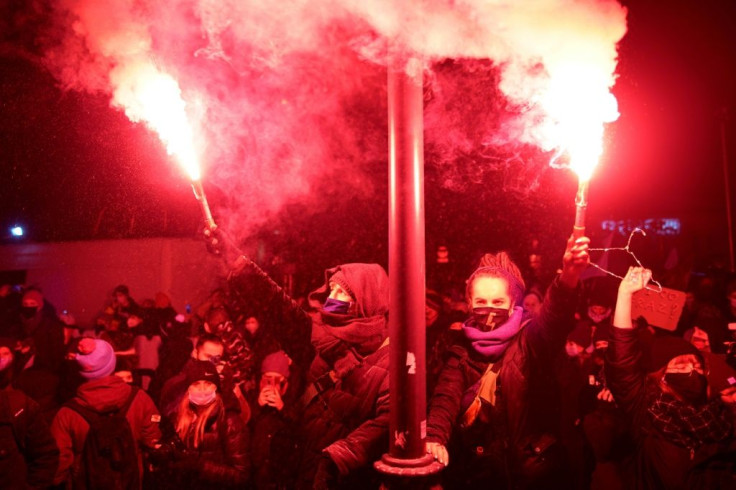Thousands Rally In Poland For Third Night Over Abortion Ban
Thousands protested for a third consecutive night in Warsaw and other parts of Poland on Friday after the country's right-wing government implemented a court ruling imposing a near-total ban on abortion.
Protesters have defied coronavirus restrictions and sub-zero temperatures to rally after the controversial judgement was given legal force on Wednesday.
In Warsaw, they waved Polish and gay rainbow flags and brandished the red lightning symbol used by Women's Strike -- the main organisation behind the protests.
"My body, my choice", "The revolution has a uterus" and "You have blood on your hands" read some of the placards at the protest.
Some of the participants also wore green handkerchiefs around their necks -- the symbol of abortion rights activists in Argentina, which legalised abortion last month.
Thousands also took to the streets in Warsaw and other major cities on Wednesday, and on Thursday several protesters were arrested after entering the perimeter of the Constitutional Court, which issued the ruling.
The verdict means that all abortions in Poland are now banned except in cases of rape and incest, or when the mother's life or health are considered to be at risk.

The ruling found that abortions in cases of foetal abnormalities were "incompatible" with the constitution.
Predominantly Catholic Poland already had one of Europe's most restrictive laws on abortion.
There are fewer than 2,000 legal abortions every year and women's groups estimate that an additional 200,000 women abort either illegally or abroad.
The government says the ban will halt "eugenic abortions", referring to the termination of foetuses diagnosed with Down's Syndrome, but human rights groups say it will force women to carry non-viable pregnancies.
The ruling first came out in October, but the government had held off on formalising it amid mass protests that quickly adopted broader anti-government slogans.
Ludwik Dorn, a commentator writing in the Gazeta Wyborcza newspaper, said the government probably decided to publish the ruling now in order to ensure that protests "burn out" before more anti-government anger over its handling of the coronavirus pandemic and the vaccine roll-out.
"Now was the least bad time," he wrote.
Dorn also said the governing Law and Justice (PiS) party could be hoping for divisions between opponents of the ruling -- those who want wider abortion rights and those who support the previous status quo.
© Copyright AFP 2024. All rights reserved.




















